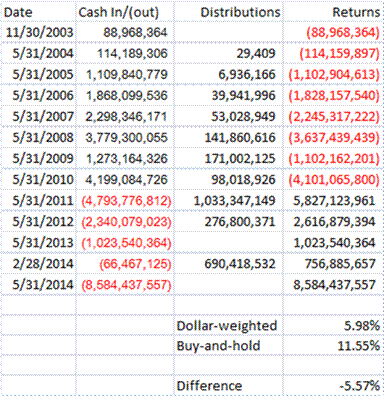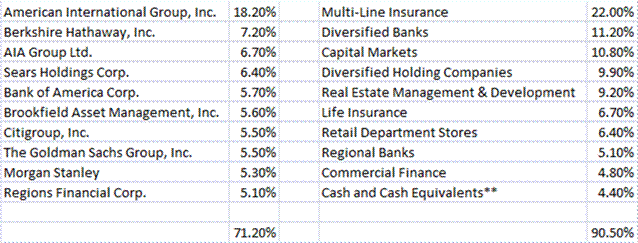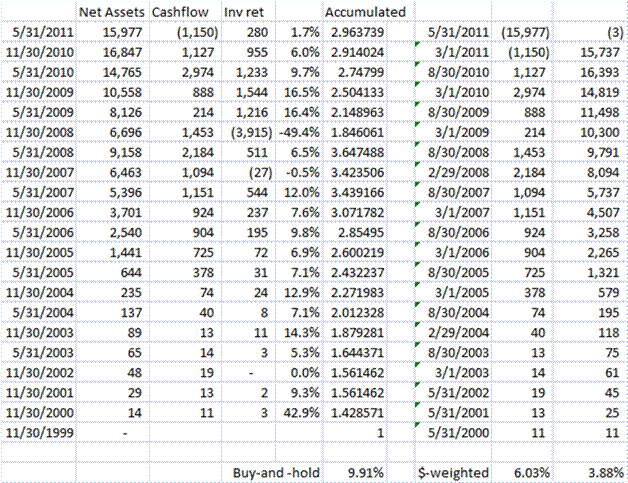Even with Good Managers, Volatility Matters

This is another episode in my continuing saga on dollar-weighted returns. We eat dollar-weighted returns.? Dollar-weighted returns are the returns investors actually receive in a open-end mutual fund or an ETF, which includes their timing decisions, as opposed to the way that performance statistics are ordinarily stated, which assumes that investors buy-and-hold.
In order for active managers to have a reasonable chance of beating the market, they have to have portfolios that are significantly different than the market. ?As a result, their portfolios will not behave like the market, and if they are good stockpickers, they will?beat the market.
Now, many of the active managers that have beaten the market run concentrated portfolios, with relatively few stocks comprising a large proportion of the portfolio. ?Alternatively, they may concentrate their portfolio in relatively few industries at a time, as I do. ?Before I begin my criticism, let me simply say that I believe in concentrated portfolios — I do that myself, but with a greater eye for risk control than some managers do.
My first article on this topic was Bill Miller, who is a really bright guy with a talented staff. ?This is the “money shot” from that piece:
Legg Mason Value Trust enthused investors as they racked up significant returns in the late 90s, and the adulation persisted through 2006.? As Legg Mason Value Trust grew larger it concentrated its positions.? It also did not care much about margin of safety in financial companies.? It bought cheap, and suffered as earnings quality proved to be poor.
Eventually, holding a large portfolio of concentrated, lower-quality companies as the crisis hit, the performance fell apart, and many shareholders of the fund liquidated, exacerbating the losses of the fund, and their selling pushed the prices of their stocks down, leading to more shareholder selling.? I?m not sure the situation has stabilized, but it is probably close to doing being there.
Investors in the Legg Mason Value Trust trailed the returns of a buy-and-hold investor by 6%/year over the time my article covered. ?Investors bought late, and sold late. ?They bought after success, and sold after failure. ?That is not a recipe for success.
 Tonight’s well-known fund with a great track record is the Fairholme Fund. Now, I am not here to criticize the recent performance of the fund, which due to its largest positions not doing well, has suffered of late. Rather, I want to point out how badly investors have done in their purchases and sales of this fund.
Tonight’s well-known fund with a great track record is the Fairholme Fund. Now, I am not here to criticize the recent performance of the fund, which due to its largest positions not doing well, has suffered of late. Rather, I want to point out how badly investors have done in their purchases and sales of this fund.
As the fame of Bruce Berkowitz (a genuinely bright guy) and his fund grew, money poured in. ?During?and after relatively poor performance in 2011, people pulled money from the fund. ?Even with relatively good performance in 2012 and 2013, the withdrawals have continued. ?The adding of money late, and the disproportionate selling after the problems of 2011 led the dollar weighted returns, which is what the average investors get, to lag those of the buy-and-hold investors by 5.57%/year over the period that I studied.
(Note: in my graph, the initial value on 11/30/2003 and the final value on 5/31/2014 are the amounts in the fund at those times, as if it had been bought and sold then — that was the time period I studied, and it was all of the data that I had. ?Also, shareholder money flows were assumed to occur mid-period.)
Lessons to Learn
- Good managers who have ideas that will work out eventually need to be bought-and-held, if you buy them at all.
- Be wary of managers who are so concentrated, that when they receive a lot of new cash after good performance, that the new cash forces the prices of the underlying stocks up. ?Why be wary? ?Doesn’t that sound like a good thing if new money forces up the price of the mutual fund? ?No, because the fund has “become the market” to its stocks. ?When the time comes to sell, it will be ugly. ?If you are in a fund like this, where the fund’s trading has a major effect on all of the stocks that it holds, the time to sell is now.
- There is a cost to raw volatility in large concentrated funds. ?The manager may have the guts to see it through, but that doesn’t mean that the fundholders share his courage. ?In general, the more volatile the fund, the less well average investors do in buying and selling the fund. ?(As an aside, this is a reason for those that oversee 401(k) plans to limit the volatility of the choices offered.
- Even for the buy-and-hold investor, there is a risk investing alongside those who get greedy and panic, if the cash flow movements are large enough to influence the behavior of the fund manager at the wrong times. ?(I.e., forced buying high, and forced selling low.)
- The forced buying high should be avoidable — the manager should come up with new ideas. ?But if he doesn’t, and flows are high relative to the size of the fund, and the market caps of investments held, it is probably time to move on.
- When you approach adding a new mutual fund to your portfolio, ask the following questions: Am I late to this party? ?Does the manager have ample room to expand his positions? ?Is this guy so famous now that the underlying investors may affect his performance materially?
- Finally, ask yourself if you understand the investment well enough that you will know when to buy and/or sell it, given you investing time horizon. ?This applies to all investments, and if you don’t know that, you probably should steer clear of investing in it, and learn more, until you are comfortable with the investments in question.
One final note: I am *not* a fan of AIG at the current price (I think reserves are understated, among other things), so I am not a fan of the Fairholme Fund here, which has 40%+ of its assets in AIG. ?But that is a different issue than why average investors have underperformed buy-and-hold investors in the Fairholme Fund.



